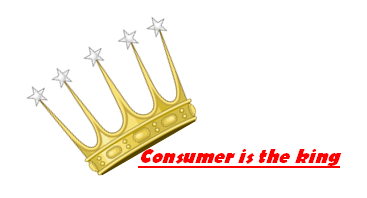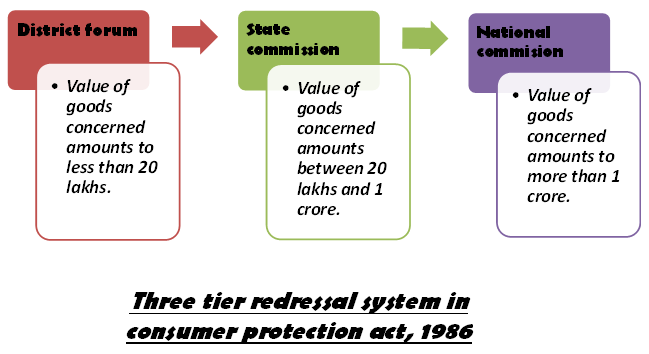Table of Content
| Category | NCERT Business Studies Class 12 Notes |
| Subject | Business Studies |
| Chapter | Chapter 11 – Marketing |
| Topic | Consumer Protection Act, 1986 Class 12 Notes |
Consumer Protection Act, 1986:
‘Indian legal framework’ consists of various laws and acts to protect the consumers. One of the acts is the consumer protection act, 1986. It was framed to protect the consumers and their interests.
It tries to safeguard the consumers from various false, exploitative, and unscrupulous activities such as defective goods, the lower quantity for higher prices, adulteration, hoarding, false or misleading advertisement, black marketing, etc.
It is very important for unorganized consumers, unaware consumers, consumer ignorance, widespread exploitation for the interest of the firm, for covering the social responsibility, etc. it is an act that provides the redressal of the consumers’ grievances in an inexpensive way.
It is not limited to big understandings but includes small and medium level understandings, private or public limited, and even cooperative societies.

Consumer Rights
This act provides various rights to the consumers which will help them to become aware and know what they deserve in the market. The rights of consumers are as under:
Right to safety
Each and every consumer has a right to safety. They should be safe from the products or services which can be hazardous to health. There are many products that are risky to use such as automobiles, domestic appliances, etc. these products when not produced keeping in mind the safety standards can lead to disaster.
For example, electronic appliances such as iron should be produced keeping in mind the safety norms.
Right to be informed
A consumer has a right to get information about the product or service which he or she wants to buy. The seller is obliged to share the information regarding the product such as date of manufacture, ingredients, expiry date, statutory warnings, directions for use, price, etc.
Right to choose
Every consumer has the right to choose from a variety of products available in the market at different prices. He has the freedom to choose from the available products and also the freedom to not buy if he or she does not like the product, nobody can force them to buy. This also implies that it is the duty of the marketer to provide a wide range of products that differ on basis of size, shape, color, quality, price, brand, etc.
Right to be heard
The consumer has a right to be heard in case he has any dissatisfaction with the product or service. They even have the right to file a complaint and be heard about their grievances. Nowadays, businesses have set up different cells for addressing questions, doubts, or grievances.
Right to seek redressal
When the consumer has any grievances or the expectations from the product or service aren’t met then he or she has the right to seek redressal. The consumer has the right to get the relief in form of replacement of the product or get an additional similar product or whatever is possible.
Right to consumer education
It is a very important right of the consumer to get information about the product or service. They must be aware of the product and the relief or redressal system available in case of any mishap or when the products do not match with the expectations or do not match with the quality that the seller promised.
Consumer responsibilities
Along with the rights, the consumer protection act has defined some responsibilities for the consumer which he or she should abide by so that they can get the redressal. These responsibilities are as under:
- The consumer should be aware of the products available in the market. They should know about the various options which are available so that they can make a rational and sound choice.
- They should be aware of the risk associated with the products and should use the risky products safely and as defined by the manufacturer to avoid any mishap.
- They should buy the products which are of assured quality for getting the better products and avoiding any exploitative activity such as buying products of ISI mark, FPO mark, Hallmark, etc.
- They should read all the information provided on the packaging of the product and labels.
- They should always ask for the bill or cash memo so that it acts as proof of the transaction.
- Consumers should also avoid joining in any way in exploitative or unscrupulous activities and always assert themselves for a fair deal.
- They should not avoid taking the action and file a complaint against any unfair trade practice even when the amount involved in the trade is small.
Redressal agencies under consumer protection act 1986
Before learning about the three-tier redressal agencies we should know how this act defines the consumer.
Consumer protection act defines a consumer as:
- Any person who buys any goods for a consideration, which has been paid or promised, or partly paid and partly promised, or under any scheme of deferred payment. It includes any user of such goods when such use is made with the approval of the buyer but does not include a person who obtains goods for resale or any commercial purpose.
- Any person who hires or avails of any service, for a consideration which has been paid or promised, or partly paid and partly promised, or under any system of deferred payment. It includes any beneficiary of services when such services are availed of with the approval of the person concerned, but does not include a person who avails of such services for any commercial purpose.
The three-tier redressal system is as under:

District forum
- Consists of a president and two other members, one should be a woman, appointed by the state government.
- It can receive complaints of the value of goods (with compensation included) up to 20 lakhs.
- After receiving the complaint, the forum will refer to the concerned party and send the goods for the test.
- When the forum is confirmed that the goods defect or any unfair trade practice was involved then they pass the judgment.
- If the aggrieved party isn’t satisfied, they can approach the state commission, within the next 30 days.
State commission
- Consists of a president and at least 2 other members, who are appointed by the state government.
- The value of goods concerned is between 20 lakhs and 1 crore.
- After receiving the complaint, the forum will refer to the concerned party and send the goods to the laboratory, if required.
- If the party is not satisfied with the judgment, they can appeal to the national commission within the next 30 days.
National commission
- Consists of a president and a minimum of 4 other members appointed by the central government.
- Value of goods exceeds 1 crore rupees along with the compensation claimed.
- After receiving the complaint, the forum will refer to the concerned party and send the goods to the laboratory, if required.
- The commission will pass the order based on the report of the laboratory.
- If the concerned party (aggrieved party) is not satisfied then they can appeal in Supreme Court for the same.
Relief available to the consumers under Consumer protection act 1986
Consumer protection act provides various ways of relief to the aggrieved consumer. They are as under:
- Removal of defects in the goods.
- Exchange or replacement of the goods or services.
- Refund of the amount paid.
- Payment of compensation for any loss or injury.
- Discontinuation of unfair trade practices.
- Withdrawal of defective or hazardous goods from the market.
- Pay for any punitive damages
- To correct the false advertisement and nullify its effect.
Consumer protection act, 1986 is a very important activity that tries to safeguard the consumers by providing them different rights and asking them to fulfill some responsibilities. It also provides a proper redressal system that is speedy and inexpensive.
BST Chapter 12 – Consumer Protection
- Consumer Protection Act, 1986
- Role of Consumer Organizations and NGOs